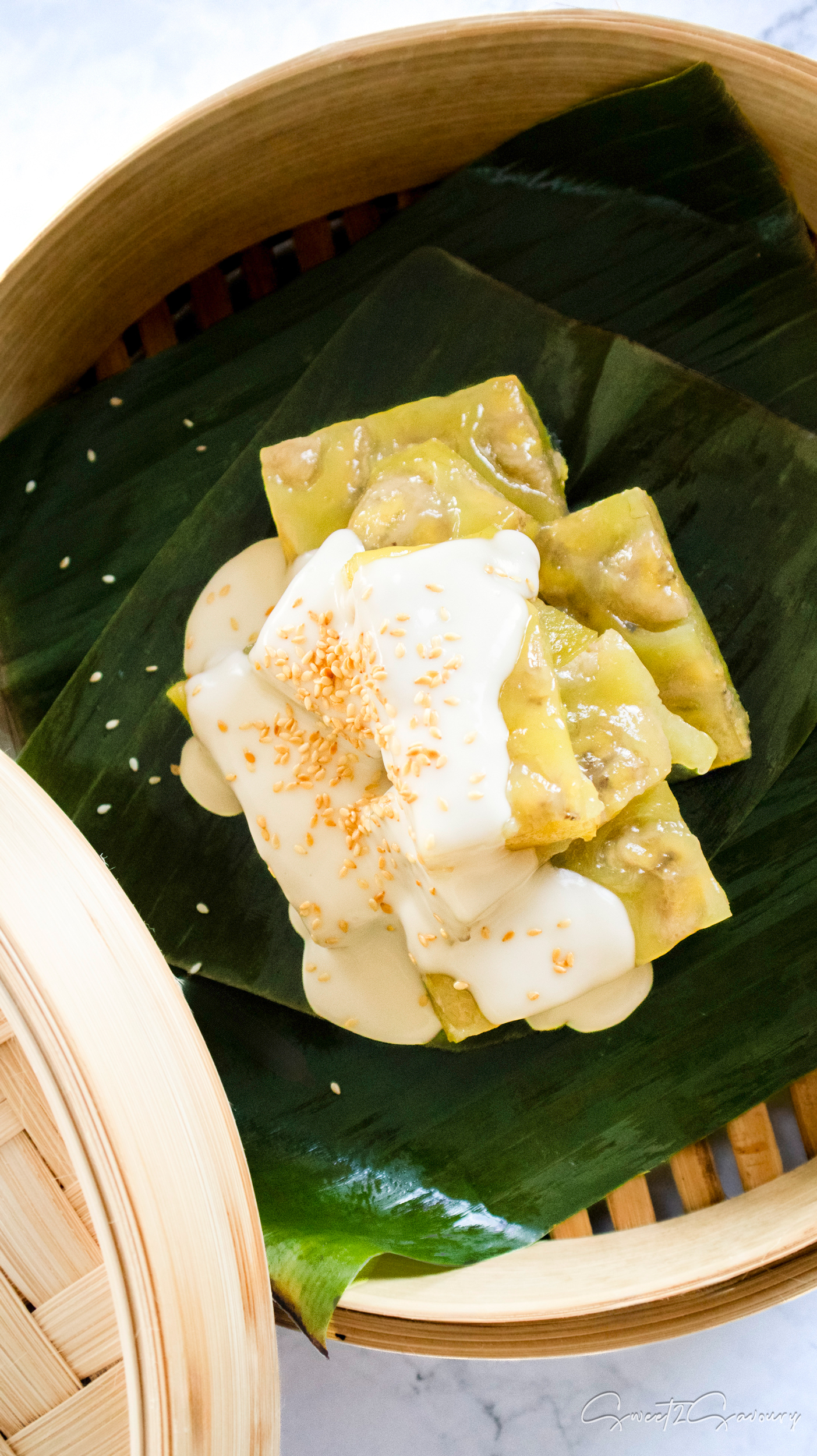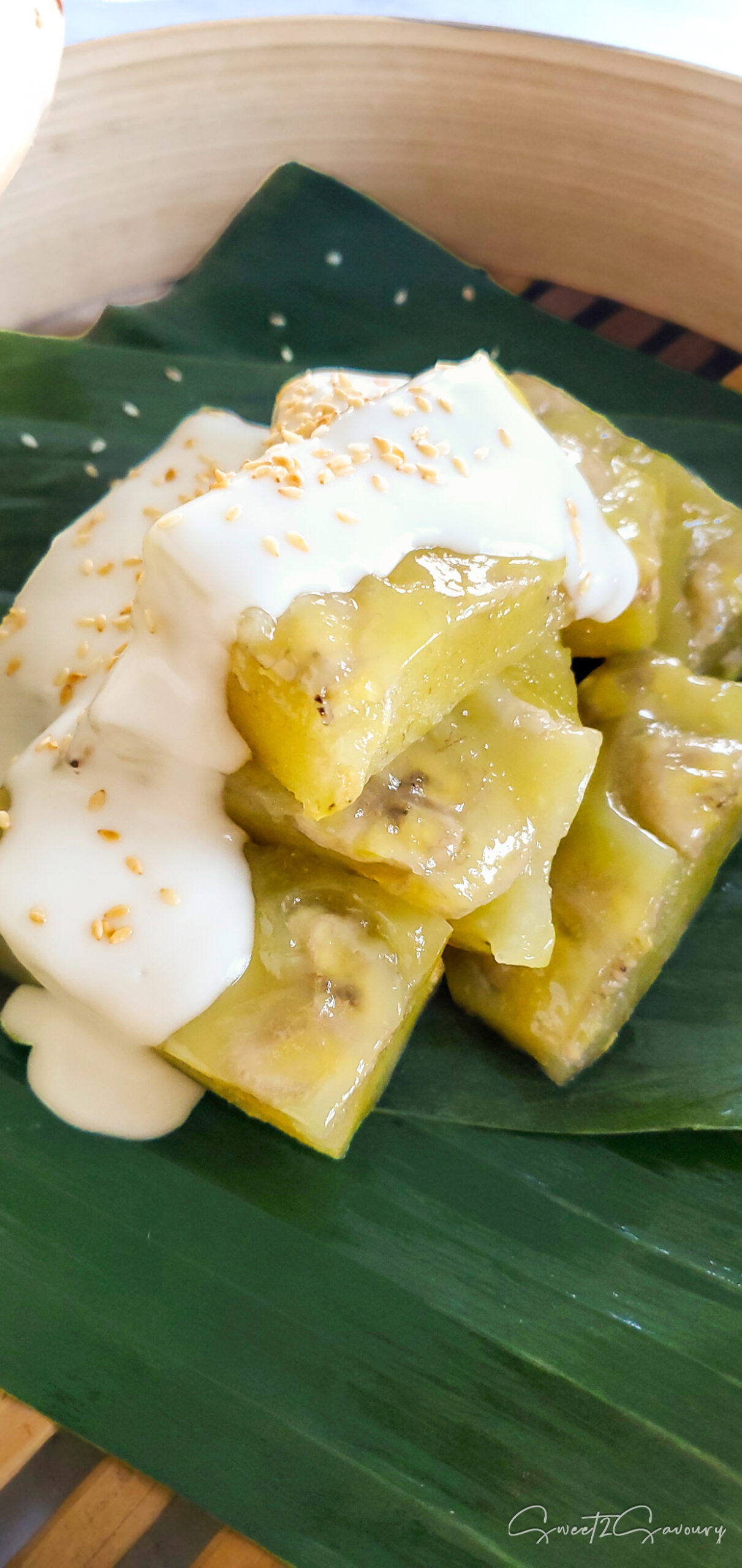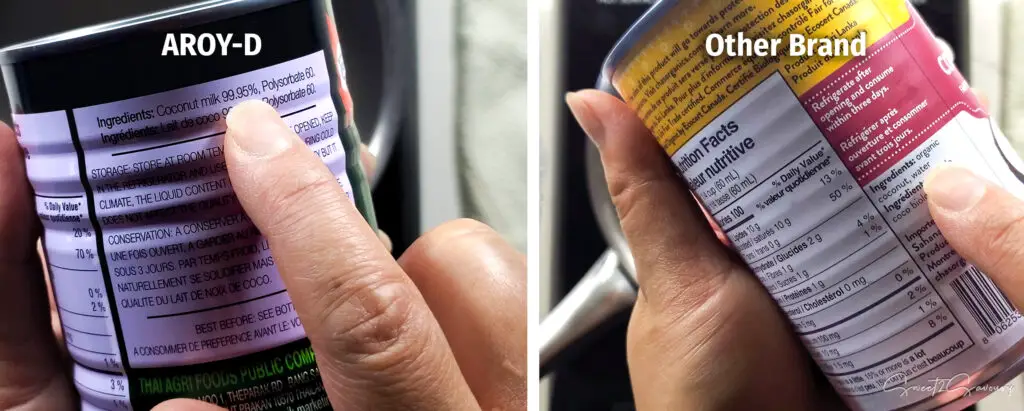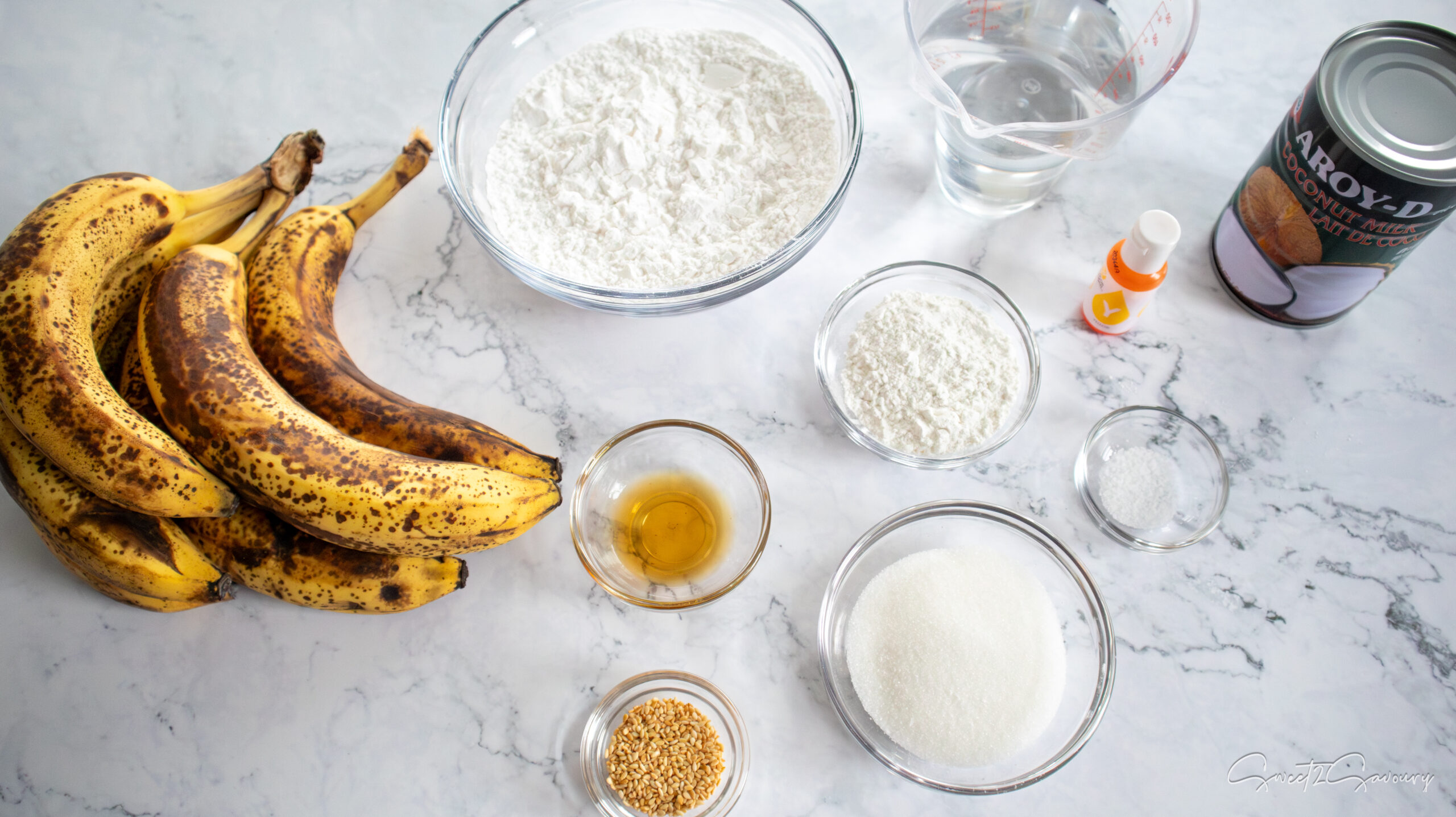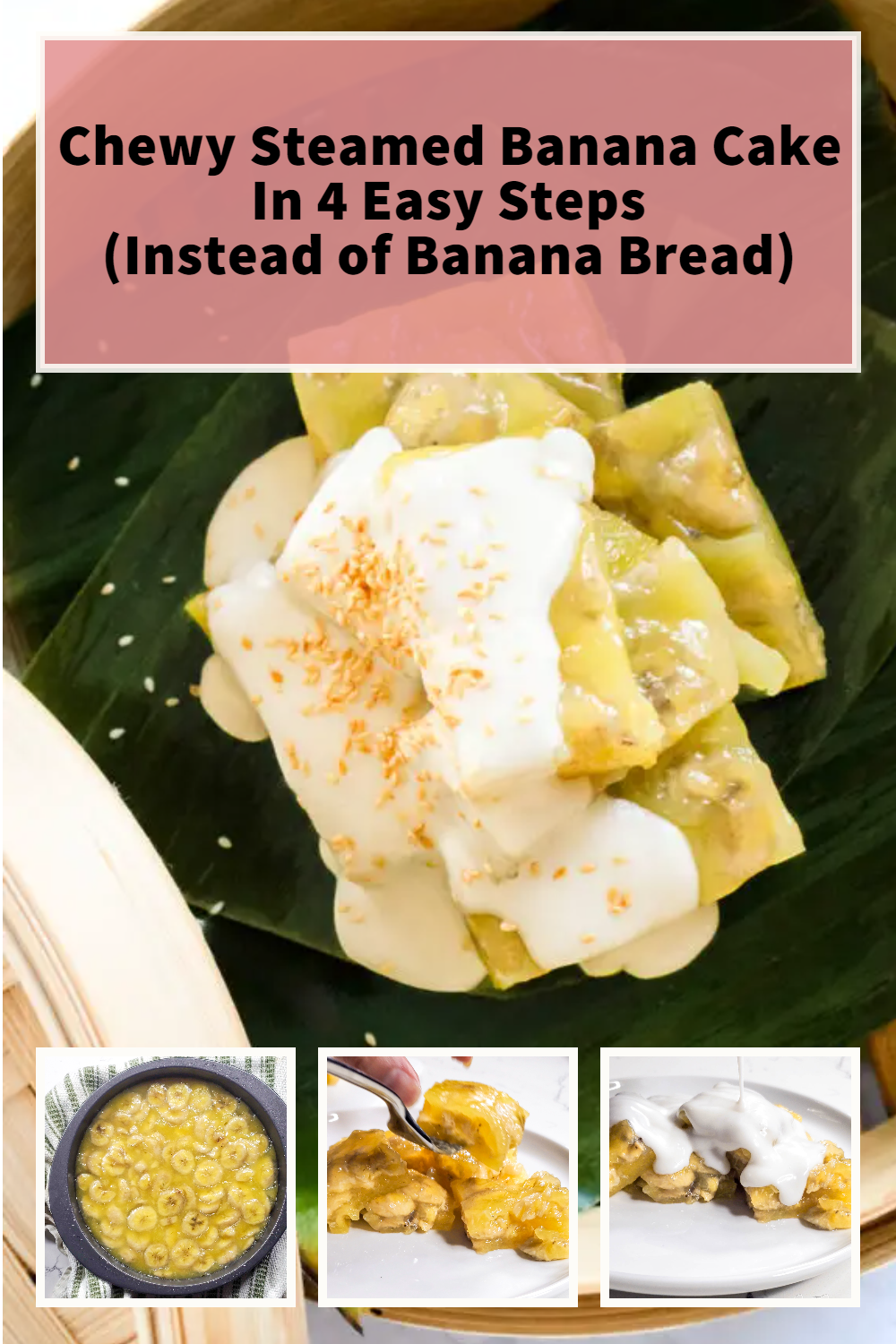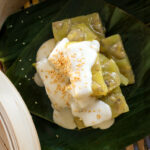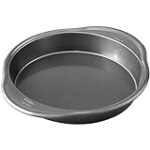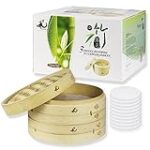This post may contain affiliate links, which means I’ll receive a commission if you purchase through my links, at no extra cost to you. This helps keep the content on my site free. please read my disclosure here
Got overripe bananas? Don’t settle for banana bread every time. This uncomplicated Vietnamese dessert starts with slices of ripe bananas mixed with sugar, salt, and a hint of vanilla extract. Blend in tapioca and rice flour batter, then steam to perfection for a satisfyingly chewy texture, all in under an hour from start to finish. Top it off with a delightful coconut milk sauce and a sprinkle of toasted sesame seeds.
Steamed Banana Cake, or “Bánh Chuối Hấp” in Vietnamese, is a delicious dessert popular in Vietnamese cuisine. It captures the tropical sweetness of ripe bananas, usually baby bananas, and is known for its unique chewy texture and tasty flavour. However, since most households have Cavendish bananas, this recipe has been adapted to use them. A perfect balance of sweet and slightly savoury flavours makes it an easy and creative way to use up your overripe bananas. So, next time you want to try something different other than banana bread, give this treat a try!
This cake is at its best when it’s at room temperature. Once it cools down, it becomes chewy and firm, making it an ideal treat to relish with the delicious coconut sauce! The use of rice and tapioca flour makes this dessert naturally gluten-free and also suitable for vegans and vegetarians. So, what are you waiting for?
If this is not what you were craving, how about Banana Coconut Upside Down Bundt Cake?
*Good To Know*
- What type of bananas should I use?
For this recipe, you can use either baby bananas or cavendish bananas (which are the classic bananas you see at your local grocery store). Although this recipe has been adapted for use with cavendish bananas, you can substitute them with baby bananas if you prefer. In this case, you should reduce the amount of water in the batter by 1/4 cup. - Which brand of coconut milk is considered to be the best option for the sauce?
I have used a lot of coconut milk in my cooking over the years, and I have tried various brands. However, I have always come to the same conclusion. Aroy-D is the best brand I have used by far (in Canada) because of its ingredients. It contains 99.95% pure coconut milk, while other brands add water as a filler to the coconut milk. When selecting a brand, look for coconut milk without added water.
Ingredients you will need:
For the bananas:
- very ripe bananas
- white granulated sugar
- kosher or fine sea salt
- vanilla extract (or vanilla sugar)
For the batter:
- tapioca flour
- rice flour (not glutinous)
- yellow food colour (optional)
For the sauce:
- coconut milk (Aroy D brand is highly recommended. See notes above for more info.)
- granulated white sugar
- cornstarch
- kosher or sea salt
For the garnish:
- Toasted sesame seeds or crushed peanuts
Step 1 – Slice and Season Bananas
Step 2 – Create and Combine The Batter
After preparing the batter, gently fold it into the sliced bananas using a spatula to combine. Take care not to break the bananas apart.
Tip
- Keep your pan and cutting board lightly greased to prevent the cooked cake from sticking
- If you don’t have a bamboo steamer, make sure to periodically dry your glass or pot lid to prevent excess water from dripping onto the cake. Alternatively, wrap the lid with a clean hand towel while steaming
- Wrap your knife with plastic wrap to prevent the cake from sticking to the knife while cutting it
Step 3 – Steam The Banana Cake
Step 4 – Make The Coconut Sauce
While the cake is steaming, you can prepare the coconut sauce. In a medium saucepan, mix together coconut milk, cornstarch, sugar, and salt. Cook the sauce over medium heat, whisking continuously until it thickens and starts to bubble about 3 to 4 minutes. It should be thick enough to coat the back of a spoon. Once done, remove from heat and let the sauce cool to room temperature before serving.
It is worth noting that the sauce will taste slightly saltier than expected, but this is intentional as it creates a nice contrast to the cake’s sweetness. If you prefer a less salty flavour, you can omit the salt altogether, but I highly recommend trying it. The saltiness complements the cake’s sweetness well!
Room-temperature cake is key!
It’s important to allow the cake to cool to room temperature, as this will give you a firm and chewy texture. Hot banana cake can be too soft to eat. To make cutting the cake easier, wrap the knife with plastic wrap to prevent sticking. For easier handling of the cake, wear food-safe gloves that are lightly greased. Cut the cake into wedges or 2-inch squares on a lightly greased cutting board and place a few of them on a plate.
Spoon coconut sauce over the cake slices and garnish with a sprinkle of toasted sesame seeds or crushed roasted peanuts. This unique flavour combination sets it apart from banana bread and I hope you enjoy it as much as I do when you make this recipe!
Vietnamese Steamed Banana Cake In 4 Easy Steps
Ingredients
For the bananas
- 6 large very ripe Bananas, peeled and cut into 1/2-inch slices
- ¼ cup white granulated sugar
- ¼ teaspoon kosher or fine sea salt, or 1/8 teaspoon Table salt
- 1 teaspoon vanilla extract, or 2 teaspoons vanilla sugar
For the batter
- 1¾ cup tapioca flour
- 3 Tablespoons rice flour (not glutinous)
- 1¼ cup lukewarm water
- 2 drops yellow food colour
For the coconut sauce
- 1 can Coconut Milk*, see notes for more info
- 4 Tablespoons granulated white sugar
- 1 Tablespoon cornstarch
- ¾ teaspoon kosher or fine sea salt, or 1/2 teaspoon Table salt
For the garnish
- 1 Tablespoon toasted sesame seeds or roasted (crushed) peanuts, divided for each serving
INSTRUCTIONS
- Prepare your steamer by heating it on medium-high heat. Make sure it is large enough to hold your cake pan of choice. I used a 9-inch cake pan and placed it into a 12-inch bamboo steamer. Peel and cut bananas into 1/2-inch slices. Place them into a bowl and sprinkle, sugar, salt, and vanilla extract on them. Gently shake the bowl to spread the seasoning. Do not stir to avoid breaking the bananas apart. Let this sit for 10 minutes for the juices to be extracted to help enhance the banana flavour.
- In a separate bowl, combine tapioca flour and rice flour. While whisking the mixture, slowly pour in lukewarm water until the batter becomes smooth and free of lumps. Add 2 drops of yellow food colour to give the batter a nice colour (this is optional). Pour and gently fold the batter into the sliced bananas using a spatula to combine, taking care not to break the bananas apart.
- Lightly grease a nonstick 9-inch round cake pan and fill it halfway with banana batter. Steam with lid** on (see notes) for 30 minutes until it turns gel-like yellow (from chalky-yellow) and slightly rises. It's done when you can lift the cake edge with a spatula without it falling apart. Cool for 20 minutes before cutting. This recipe makes two cakes, so work in batches or use a second cake pan.
- While the cake is steaming, prepare the coconut sauce. In a medium saucepan, mix coconut milk*, cornstarch, sugar, and salt***. Cook the sauce over medium heat, whisking continuously until it thickens and starts to bubble about 3 to 4 minutes. It should be thick enough to coat the back of a spoon. Remove from heat and let it cool to room temperature before serving.
To serve the cake
- It’s important to allow the cake to cool to room temperature, as this will give you a firm and chewy texture. Hot banana cake can be too soft to eat. To make cutting the cake easier, wrap the knife with plastic wrap to prevent sticking. For easier handling of the cake, wear food-safe gloves that are lightly greased. Cut the cake into wedges or 2-inch squares on a lightly greased cutting board. To serve, place a few slices on a plate. Spoon coconut sauce over the cake slices and garnish with a sprinkle of toasted sesame seeds or crushed roasted peanuts.

